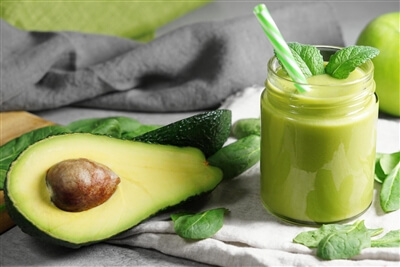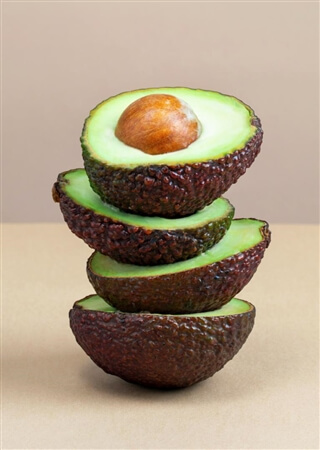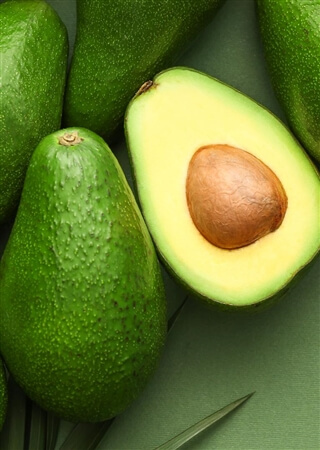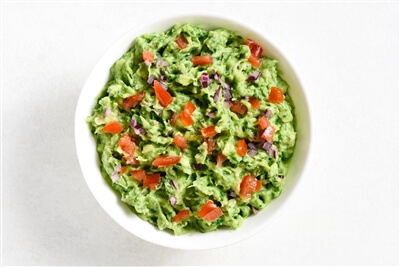Fun facts that every avocado lover should know
Avocados are celebrated worldwide for their creamy texture, unique flavour, and numerous health benefits. Here are some interesting facts that every avocado enthusiast should know.
Is avocado a fruit?
Although many consider it a vegetable due to its savory flavour, botanically speaking, avocado is actually a fruit. Specifically, it is considered a large berry with a single seed.
Unlike most fruits that are high in carbohydrates, avocados are rich in healthy fats, making them a unique addition to the fruit family.
Are avocado seeds edible?
Yes they are and, when grated or crushed, they are a valuable source of macronutrients and micronutrients for salads, and smoothies.
In fact the seed of the avocado contains approx. 70% of the antioxidants of the whole fruit.
Is avocado a fruit?
Although many consider it a vegetable due to its savory flavour, botanically speaking, avocado is actually a fruit. Specifically, it is considered a large berry with a single seed.
Unlike most fruits that are high in carbohydrates, avocados are rich in healthy fats, making them a unique addition to the fruit family.
Are avocado seeds edible?
Yes they are and, when grated or crushed, they are a valuable source of macronutrients and micronutrients for salads, and smoothies.
In fact the seed of the avocado contains approx. 70% of the antioxidants of the whole fruit.

Who cultivated them first?
Avocado belongs to the Lauraceae family. It is originated in Mexico and Central America, with the ancient Maya being among the first to cultivate it.
Which country produces the most avocados?
Mexico, the world's largest producer, exports huge quantities of avocados, with over 2.8 billion sent to the US in 2021 and more than 80,000 tonnes to Europe between 2019 and 2020.
According to the OECD-FAO, the avocado market is set to grow by 5.2% per year over the next ten years, with exports from Mexico expected to increase to 63% by 2030.
Why do avocados have such a large seed?
The large seed is a remnant from millions of years ago when megafauna like the giant ground sloth dispersed avocado seeds.
These animals consumed the fruit whole, including the seed, which was then spread through their digestive systems.
Avocado belongs to the Lauraceae family. It is originated in Mexico and Central America, with the ancient Maya being among the first to cultivate it.
Which country produces the most avocados?
Mexico, the world's largest producer, exports huge quantities of avocados, with over 2.8 billion sent to the US in 2021 and more than 80,000 tonnes to Europe between 2019 and 2020.
According to the OECD-FAO, the avocado market is set to grow by 5.2% per year over the next ten years, with exports from Mexico expected to increase to 63% by 2030.
Why do avocados have such a large seed?
The large seed is a remnant from millions of years ago when megafauna like the giant ground sloth dispersed avocado seeds.
These animals consumed the fruit whole, including the seed, which was then spread through their digestive systems.


How many avocado varieties exist?
There are more than 500 varieties of avocado worldwide. They come in different in sizes, textures, shapes, and maturity levels. However some of the most popular varieties are:
Hass: Small with thick, bumpy skin and firm flesh.
Lula: Large with shiny yellow-green skin.
Ettinger: Elongated with smooth green skin and a delicate flavour.
Fuerte: Pear-shaped with thin, dark green skin and buttery flesh.
Nabal: Round with firm flesh, suitable for cooking.
Are avocados high in sugar?
No they are not! Quite the opposite; avocados are low in water and sugars but high in calories, with 500-600 kcal per large fruit.
They primarily contain monounsaturated fatty acids, such as omega-9 oleic acid, and vitamin E.
Avocados are also rich in fibre, vitamins (C, E, B5, B6, K, folate), and minerals (potassium, magnesium, zinc, manganese, phosphorus).
They contain no cholesterol and are abundant in phytosterols, which are known for their numerous health benefits, particularly their ability to reduce LDL cholesterol - the so-called 'bad cholesterol'- levels in the blood.
There are more than 500 varieties of avocado worldwide. They come in different in sizes, textures, shapes, and maturity levels. However some of the most popular varieties are:
Hass: Small with thick, bumpy skin and firm flesh.
Lula: Large with shiny yellow-green skin.
Ettinger: Elongated with smooth green skin and a delicate flavour.
Fuerte: Pear-shaped with thin, dark green skin and buttery flesh.
Nabal: Round with firm flesh, suitable for cooking.
Are avocados high in sugar?
No they are not! Quite the opposite; avocados are low in water and sugars but high in calories, with 500-600 kcal per large fruit.
They primarily contain monounsaturated fatty acids, such as omega-9 oleic acid, and vitamin E.
Avocados are also rich in fibre, vitamins (C, E, B5, B6, K, folate), and minerals (potassium, magnesium, zinc, manganese, phosphorus).
They contain no cholesterol and are abundant in phytosterols, which are known for their numerous health benefits, particularly their ability to reduce LDL cholesterol - the so-called 'bad cholesterol'- levels in the blood.

How can they be eaten?
Avocados are versatile and can be used in various dishes.
They can be used for making guacamole, a classic dip made with mashed avocado, lime juice, salt, and seasonings; in salads for creaminess and nutrition; on toast as breakfast or snack; in smoothies to enhance texture; or in desserts such as vegan cheesecake and chocolate mousse.
Need some avocado inspiration?
If you need some inspiration on how you can incorporate avocados in your diet here are some simple tips on how to make your very own guacamole!
Ingredients for one bowl of guacamole:
1 ripe avocado
1 green chili pepper
1 tomato
20 g extra virgin olive oil
1/2 lime
10 g shallots
Black pepper and salt
Preparation:
Peel and mash the avocado together with lime juice, salt, and pepper.
Add finely chopped shallots, diced tomato, and sliced chili pepper.
Mix with olive oil and adjust seasoning.
Avocados are versatile and can be used in various dishes.
They can be used for making guacamole, a classic dip made with mashed avocado, lime juice, salt, and seasonings; in salads for creaminess and nutrition; on toast as breakfast or snack; in smoothies to enhance texture; or in desserts such as vegan cheesecake and chocolate mousse.
Need some avocado inspiration?
If you need some inspiration on how you can incorporate avocados in your diet here are some simple tips on how to make your very own guacamole!
Ingredients for one bowl of guacamole:
1 ripe avocado
1 green chili pepper
1 tomato
20 g extra virgin olive oil
1/2 lime
10 g shallots
Black pepper and salt
Preparation:
Peel and mash the avocado together with lime juice, salt, and pepper.
Add finely chopped shallots, diced tomato, and sliced chili pepper.
Mix with olive oil and adjust seasoning.
ARTICLES YOU MAY LIKE






